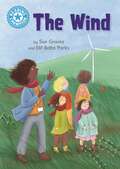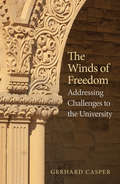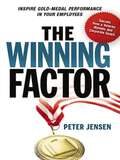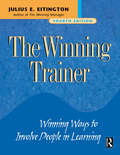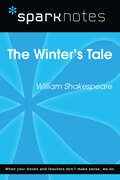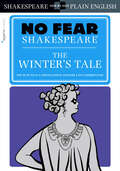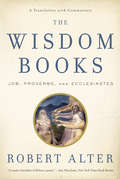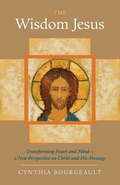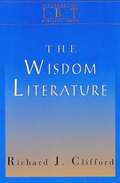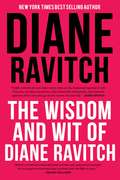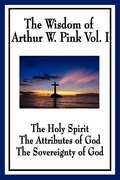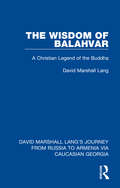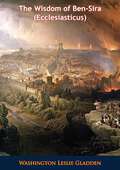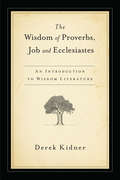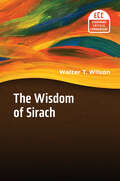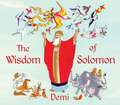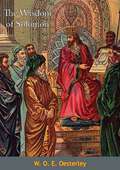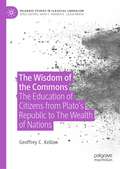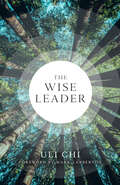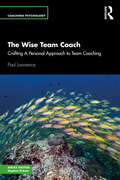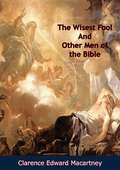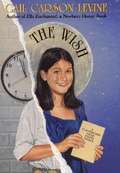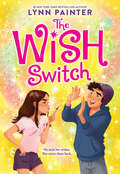- Table View
- List View
The Wind in the Willows
by Kenneth GrahameThe escapades of four animal friends who live along a river in the English countryside--Toad, Mole, Rat, and Badger.
The Wind: Independent Reading Non-Fiction Blue 4 (Reading Champion #1106)
by Sue GravesThis book is part of Reading Champion, a series carefully linked to book bands to encourage independent reading skills, developed with UCL Institute of Education (IOE)The Wind is a non-fiction text explaining the effects of the wind. The simple sentence structure offers readers the opportunity for an independent reading experience with the support of the illustrations.Reading Champion offers independent reading books for children to practise and reinforce their developing reading skills.This early non-fiction text is accompanied by engaging artwork and a reading activity. Each book has been carefully graded so that it can be matched to a child's reading ability, encouraging reading for pleasure.
The Winds of Freedom
by Prof. Gerhard CasperAs president of Stanford University, Gerhard Casper established a reputation as a tireless, forward-thinking advocate for higher education. His speeches, renowned for their intelligence, humanity, wit, and courage, confront head-on the most pressing concerns facing our nation's universities. From affirmative action and multiculturalism to free speech, politics, public service, and government regulation, Casper addresses the controversial issues currently debated on college campuses and in our highest courts. With insight and candor, each chapter explores the context of these challenges to higher education and provides Casper's stirring orations delivered in response. In addressing these vital concerns, Casper outlines the freedoms that a university must encourage and defend in the ongoing pursuit of knowledge.
The Winning Factor: Inspire Gold-Medal Performance in Your Employees
by Peter JensenOlympic athletes don't get to the top simply because of athletic genes (nature) or determined parents (nurture). Like all performers in pressure situations, their exceptional drive comes from a third factor: an inner desire to be the best they can be. The Winning Factor reveals how to ignite the passion and the resolve required to succeed. As someone who has trained both Olympic athletes and Fortune 500 executives, Peter Jensen knows how to translate the best practices of world-class coaches into the everyday business realm. Readers will discover: ò Five key practices of medal-winning coaches: managing themselves, building trust, using imagery, overcoming blocks, and embracing adversity ò The secrets behind great communication and truly effective feedback ò Insights on leader ship from six Olympic coachesùwith guidelines for applying these lessons to the workplace Packed with engaging stories and enlightening examples, The Winning Factor teaches managers everywhere how to inspire standout performance from their employees.
The Winning Trainer: Winning Ways To Involve People In Learning
by Julius E. EitingtonThis book has more ideas on how to add involvement in learning than any one trainer could ever use. Your students and workshop participants will increase their understanding and retention when you design training activities using 'The Winning Trainer'. This updated and expanded edition is richer than ever before. It provides: * more than 100 ready-made handouts, learning instruments, and worksheets... all you do is photocopy * numerous examples, model dialogues, and sample answers * hundreds of exercises, games, puzzles, role plays, icebreakers, and other group-in-action techniques * samples of each technique and ways to effectively use them * advice on subjects such as unwilling participants, use of the outdoors, breaks, program endings, and storytellingSignificant new additions to the book include materials on the following topics:* new, easier to accomplish approaches to evaluation - ROE (Return on Expectations) and Customer Satisfaction as a business indicator* a methodology to secure group feedback at the end of the program, concerning the trainer/facilitator's role and participation in the course* an instrument for the early screening of likely obstacles when transferring training* added techniques to ensure that training transfers to the job* a demonstration of how to conduct a quick assessment of needs when under pressure to do so* keys to successful training in other cultures* several new instruments including how to assess one's prowess as a facilitator, how to assess trust in a team, and how to measure one's CQ (creativity quotient)Two new chapters have been added to treat new material on intelligence and learning, principles of adult learning and distance learning. In addition, numerous new group-in-action techniques and conceptual materials have been added to the existing chapters.This is the one-stop source book every trainer needs.
The Winter's Tale (SparkNotes Literature Guide Series)
by SparkNotesThe Winter's Tale (SparkNotes Literature Guide) by William Shakespeare Making the reading experience fun! Created by Harvard students for students everywhere, SparkNotes is a new breed of study guide: smarter, better, faster. Geared to what today's students need to know, SparkNotes provides: *Chapter-by-chapter analysis *Explanations of key themes, motifs, and symbols *A review quiz and essay topicsLively and accessible, these guides are perfect for late-night studying and writing papers
The Winter's Tale: No Fear Shakespeare Side-by-Side Plain English (No Fear Shakespeare)
by William Shakespeare SparkNotesRead Shakespeare&’s plays in all their brilliance—and understand what every word means! Don&’t be intimidated by Shakespeare! These popular guides make the Bard&’s plays accessible and enjoyable.Each No Fear guide contains:The complete text of the original playA line-by-line translation that puts the words into everyday languageA complete list of characters, with descriptionsPlenty of helpful commentaryWild jealousy. Unfounded accusations. Death and rebirth. And, of course, &“Exeunt, chased by a bear&”—one of Shakespeare&’s most famous stage directions. Leontes, King of Sicily, suddenly becomes insane with jealousy believing his pregnant wife has been unfaithful to him. Acting upon his rage, he sets a tragedy in motion that will cost him, his family, and his friends dearly.
The Winter’s Tale
by Edited by N. K. DasguptaThis is the collections of Shakespeare’s tales and edited with notes General Introduction, Introduction to the Play, Text with Paraphrase, Scene wise Summary, Character-Sketches, Explanatory Notes, Explanations of Important Passages, Questions and Answers including Objective Type Questions, etc.
The Wisdom Books: A Translation with Commentary
by Robert AlterFirst time in paperback: "One of the most ambitious literary projects of this or any age."--Adam Kirsch, New Republic Here in Robert Alter's bold new translation are some of the most magnificent works in world literature. The astounding poetry in the Book of Job is restored to its powerful ancient meanings and rhythms. The creation account in its Voice from the Whirlwind is beautiful and incendiary. By contrast, a serene fatalism suffuses Ecclesiastes with a quiet beauty, and the pithy maxims of Proverbs impart a worldly wisdom that is satirically shrewd. Each of these books addresses the universal wisdom that the righteous thrive and the wicked suffer in a rational moral order; together they are essential to the ancient canon that is the Hebrew Bible.
The Wisdom Jesus: Transforming Heart and Mind--A New Perspective on Christ and His Message
by Cynthia BourgeaultIf you put aside what you think you know about Jesus and approach the Gospels as though for the first time, something remarkable happens: Jesus emerges as a teacher of the transformation of consciousness. Cynthia Bourgeault is a masterful guide to Jesus's vision and to the traditional contemplative practices you can use to experience the heart of his teachings for yourself.
The Wisdom Literature: Interpreting Biblical Texts Series (Interpreting Biblical Texts)
by Richard J. CliffordIn this volume, Richard J. Clifford seeks to make the biblical wisdom literature intelligible to modern readers. It is easy to quote the occasional proverb, say a few things about "the problem of evil" in Job, or quote "vanity of vanities, " but far more rewarding to read the whole book with an appreciative and informed eye. Opening chapters of The Wisdom Literature comment on the striking similarities between ancient and modern "wisdom literature" and on the comparable literature from ancient Mesopotamia, Egypt, and Canaan. Thereafter, a chapter is devoted to each biblical wisdom book (Proverbs, Job, Ecclesiastes, Song of Songs, Sirach, and Wisdom of Solomon), studying not only its content but also its rhetoric -- how it engages the reader.
The Wisdom and Wit of Diane Ravitch
by Diane RavitchIn this unique collection of her most important writings, Diane Ravitch provides remarkable insights into her seminal thinking on public education, and on the dangers to democracy of treating parents as consumers, students as products, and teachers as compliant followers of commercial scripts.
The Wisdom of Arthur W. Pink
by Arthur W. PinkArthur W. Pink was a minister and world traveler. During his life time he was a prolific author writing books on all aspects of Christianity. He was one of the most influential evangelical authors in the second half of the twentieth century. Collected her in this omnibus edition are The Holy Spirit, The Attributes of God. The Sovereignty of God.
The Wisdom of Balahvar: A Christian Legend of the Buddha (David Marshall Lang's Journey from Russia to Armenia via Caucasian Georgia #3)
by David Marshall LangOriginally published in 1957 and forming a companion volume to The Balavariani, this volume provides valuable research into the biography of Gautama Buddha and its influence on medieval Christian thought. This work, the romance of Barlaam and Josaphat, was included by Caxton in The Golden Legend and inspired the episode of the Caskets in Shakespeare’s The Merchant of Venice; its heroes were venerated as Saints. Over a century ago, however, the legend was finally identified as an adaptation of episodes from the life and ministry of the Buddha. The first part of the book is devoted to tracing the development and migration of the Barlaam and Josaphat legend from its original Buddhist environment to the West. The second part is a translation of the Georgian text – the first published in any Western European language. The volume therefore gives one of the oldest Near Eastern versions of the story.
The Wisdom of Ben-Sira (Ecclesiasticus)
by Washington Leslie GladdenThe Book of Sirach is a Jewish work, originally in Hebrew, of ethical teachings, from approximately 200 to 175 BC, written by the Judahite scribe Ben Sira of Jerusalem, on the inspiration of his father Joshua son of Sirach, sometimes called Jesus son of Sirach or Yeshua ben Eliezer ben Sira.In Egypt, it was translated into Greek by the author's unnamed grandson, who added a prologue. This prologue is generally considered the earliest witness to a canon of the books of the prophets, and thus the date of the text is the subject of intense scrutiny. The book itself is the largest wisdom book from antiquity to have survived.-Wiki
The Wisdom of Proverbs, Job and Ecclesiastes
by Derek Kidner"The fear of the Lord is the beginning of wisdom." In the Wisdom literature of the Bible we first hear the cool voice of a teacher calling us to think--to think hard and humbly. "How long will fools hate knowledge?" cries Wisdom in the book of Proverbs. Then in Job comes the anguished voice of the questioner, earnest enough to seek answers, honest enough to doubt easy ones. In Ecclesiastes the chastened tone of the Preacher warns of the vanity of all life under the sun. Sensitive to both literary form and theological content, Derek Kidner introduces Proverbs, Job and Ecclesiastes, explaining their basic character and internal structure. He also summarizes and evaluates the wealth of modern criticism focused on each book. Looking at all three books together, Kidner shows how their many voices compare, contrast and ultimately give a unified view of life. Kidner extends his analysis to include Ecclesiasticus and The Wisdom of Solomon from the Apocrapha, and he reprints excerpts from non-Israelite works that parallel the three major books treated.
The Wisdom of Sirach (Eerdmans Critical Commentary)
by Walter T. WilsonStudy the wisdom of Ben Sira. A deuterocanonical collection of proverbs from the intertestamental period, the Book of Sirach has been treated by many Protestants as a bit of Catholic trivia. Yet careful study of Sirach reveals fascinating insights into Jewish thought two centuries before Jesus. Walter T. Wilson invites scholars and nonspecialists alike to discover the wisdom of this important yet under-studied text.A temple scribe writing in the second century BCE, Ben Sira aimed to instill fear of the Lord and discipline in his community. Interweaving practical advice and theoretical wisdom, his book instructs readers—then and now—in the principles of wisdom so that they may apply them to right action and lead the good life.Based on the New Revised Standard Version, Wilson&’s commentary explicates the translated English text with careful attention to its historical and religious contexts, formal qualities, prevailing themes, and place in the canon (or lack thereof). The volume includes a helpful bibliography and notes.
The Wisdom of Solomon
by DemiIn ancient times the legendary wisdom of King Solomon (c. 990-931 BCE) was known far and wide. The Bible recounts that God loved Solomon greatly and appeared to him in a dream saying, &“Ask! What shall I give you?&” Solomon chose neither riches nor fame, but answered, &“Give to Your servant an understanding heart, that I may discern between good and evil.&” God was so pleased with Solomon's response that, besides a &“wise and understanding heart,&” He gave him &“both riches and honor,&” so that there should be none &“like you among the kings all your days&” (1 Kings 3:3-13). Some traditions, both Jewish and Christian, tell that Solomon also received a magic ring from the angel Michael, giving him the power to rule over creatures―Solomon even knew the language of the birds! Award-winning author, Demi, recounts the extraordinary life of King Solomon, from his meeting with the Queen of Sheba to the building of the great temple of the Lord in Jerusalem. An appendix features a selection of Solomon's most famous wisdom sayings.
The Wisdom of Solomon
by W. O. E. OesterleyTHE Book of Wisdom is one of the most notable among those comprised in the Wisdom, or Chokmah, Literature of the Jews. The Books belonging to this Literature which have come down to us are, in addition to that under consideration, Proverbs, Job, Ecclesiastes, and the Wisdom of Ben-Sira (Ecclesiasticus); besides these, some of the later Psalms are evidently the work of Chakamim, or “Wise men”; and here and there in what are known as the Pseudepigrapha there are distinct signs of the influence of the “Wise men.In the introduction to The Wisdom of Solomon, W. O. E. Oesterley covers the title, authorship and composition, the date of the book, the connection between the Wisdom Books and the Pauline epistles, and more. Oesterley then provides the English translation along with pertinent notes.Rev. William Oscar Emil Oesterley (Calcutta 1866–1950) was a Church of England theologian, and professor of Hebrew and Old Testament at King's College, London, from 1926.
The Wisdom of the Commons: The Education of Citizens from Plato’s Republic to The Wealth of Nations (Palgrave Studies in Classical Liberalism)
by Geoffrey C. KellowThe Wisdom of the Commons examines the history and philosophy of civic education as the essential political part of liberal education. This study distinguishes itself from other works on liberal and civic education by focusing explicitly on the civic and liberal education of those citizens who are not destined for prominent positions within politics and government but are still a part of and relevant to political society. It considers this strand of liberal and civic education, in both its ancient and modern iterations, by focusing on the philosophies of Plato, Cicero, Locke, Rousseau, and Adam Smith.
The Wise Leader
by Uli ChiLeading and mentoring begins with wisdom. Though we are overwhelmed with information, we often struggle to find true wisdom. Yet those leading or mentoring others, whether in business or in spiritual life, must rely on wisdom&’s guidance to lead with purpose and meaning. With decades of leadership experience in business, nonprofits, and Christian higher education, Uli Chi helps readers build this foundational virtue. Looking to Scripture as well as art and literature, Chi illuminates the nature of wisdom as fundamentally relational and other-centered. In the context of leadership, biblical wisdom shows us the importance of wielding power with humility. Chi also provides a framework for the formation of character and vision in the lifelong journey of gaining wisdom. Full of substantive and practical reflections, The Wise Leader both forms young leaders and teaches experienced leaders how to pass on the torch meaningfully.
The Wise Team Coach: Crafting A Personal Approach To Team Coaching (Coaching Psychology)
by Paul LawrenceBased on three years of meta- research into team effectiveness and coaching, this book explores some of the most common contradictions and debates around the topic of team coaching and presents readers with a framework to enable them to explore this field for themselves, reflecting on their own experience and drawing their own conclusions.Team coaching in organisations is still a relatively new discipline, with industry associations having only recently defined their first attempts to frame team coaching in the form of standard skills and competencies. As a new discipline we still see multiple perspectives on what team coaching is, and how it should best be practiced. The literature abounds with paradox and contradictions. Within this book Lawrence delves into these contradictions and debates, providing a framework to encourage readers to construct their own practice model. Covering both theory and practical application, this will be a useful guide for both experienced team coaches and those entering the field.
The Wisest Fool And Other Men of the Bible
by Clarence Edward MacartneyAs a master of biographical preaching, Macartney examines the successes and failures of great Bible characters.“INCLUDING THOSE IN THIS BOOK, I FIND THAT I HAVE preached 167 sermons on the characters of the Bible. In a number of instances, however, some of the sermons have dealt with different aspects of the same men and women, or with different incidents in their lives. It has been a long and delightful study for me. I discovered early in my ministry that people like biography; and nowhere is there such biography, so stirring, so moving, so uplifting, so tragic, as that to be found in the Bible.It has been a joy to me to learn that these different volumes of sermons on Bible characters have been suggestive and of help to not a few preachers in their own work and ministry. There are still other interesting men and women in the Bible about whom I have never preached a sermon. Perhaps at some time in the future I shall be able to preach on them also.”-Foreword
The Wish
by Gail Carson LevineWhen granted her wish to be the most popular girl in school, Wilma, an eighth grader, forgets that she will graduate in three weeks and her popularity will vanish.
The Wish Switch
by Lynn PainterMagic and mayhem collide in beloved #1 New York Times bestselling author Lynn Painter&’s hilarious children's book debut, perfect for fans of Sarah Mlynowski and Wendy Mass. Emma Rockford knows it will take bonafide magic to make middle school everything she wants it to be. Luckily, before Emma&’s beloved Nana died, she left detailed instructions on how to access an ancient, secret, magical wishing well. Emma follows each step and plans out every moment…except for the one where the obnoxious new kid, Jackson, tosses in wishes of his own that literally knock her wishes off course. When seventh grade starts, Emma discovers that her wishes are starting to come true, alright. But not for her…for Jackson. Which, the two quickly discover, could have disastrous consequences for both of their families, and cost Emma her best friends. Can they set everything straight in time to prevent full-blown catastrophe? With the trademark wit and heart that have earned her legions of fans, #1 New York Times bestselling author Lynn Painter delivers a laugh-out-loud story of friendship, family, and wishing—with a delightful dash of magic.

